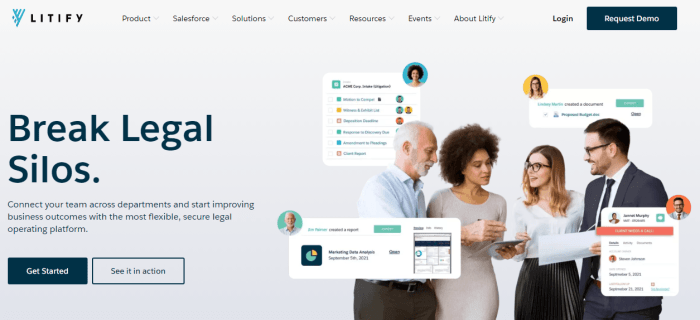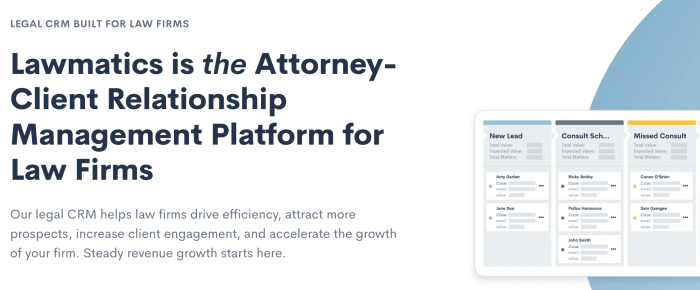Best crm software for law firms – In today’s competitive legal landscape, efficient client relationship management (CRM) is no longer a luxury—it’s a necessity. A robust CRM system can streamline operations, improve client communication, and ultimately boost your law firm’s profitability. This comprehensive guide explores the best CRM software options specifically designed to meet the unique needs of law firms, helping you choose the perfect solution to enhance your practice management.
Understanding the Needs of Law Firms: Why Specialized CRM is Crucial
Law firms have specific requirements that differ from other industries. Standard CRM software often lacks the features necessary for managing complex cases, client confidentiality, and legal compliance. A dedicated legal CRM should offer:

Source: webfx.com
- Secure Data Storage and Access Control: Protecting sensitive client information is paramount. The CRM must adhere to strict data privacy regulations like GDPR and CCPA.
- Matter Management Capabilities: Effective tracking of cases, deadlines, and associated documents is essential for efficient workflow.
- Client Communication Tools: Seamless integration with email, calendar, and potentially even video conferencing for improved client interaction.
- Document Management: Centralized storage and easy access to legal documents, ensuring nothing gets lost or misplaced.
- Time Tracking and Billing: Accurate time tracking is crucial for accurate billing and profitability analysis.
- Reporting and Analytics: Data-driven insights into client interactions, case progress, and overall firm performance.
- Integration with Other Legal Software: Compatibility with existing legal tech solutions, such as practice management software and e-discovery platforms.
Top CRM Software Options for Law Firms
Choosing the right CRM depends on your firm’s size, budget, and specific needs. Here are some of the leading contenders:
1. Clio Manage
Clio Manage is a popular choice among law firms, known for its comprehensive features and user-friendly interface. It offers robust matter management, time tracking, billing, and client communication tools. Its strong integration capabilities make it a versatile solution for various firm sizes.
2. MyCase, Best crm software for law firms
MyCase provides a similar suite of features to Clio, with a focus on simplifying legal practice management. It’s particularly praised for its ease of use and intuitive design, making it a good option for firms looking for a less complex solution.
3. PracticePanther
PracticePanther stands out with its strong emphasis on automation and efficiency. It offers features like automated email reminders, streamlined billing processes, and robust reporting capabilities, making it ideal for firms seeking to optimize their workflows.
4. CosmoLex
CosmoLex is a more comprehensive solution often favored by larger law firms. It provides a wide range of features, including advanced case management, trust accounting, and detailed reporting, making it suitable for complex legal practices.

Source: geekflare.com
5. CaseText
CaseText offers a unique approach by integrating legal research directly into its CRM. This allows lawyers to access relevant case law and legal information directly within the platform, improving research efficiency.
Choosing the Right CRM: Factors to Consider
Selecting the best CRM involves careful consideration of several factors:
- Firm Size and Complexity: Smaller firms may find simpler solutions sufficient, while larger firms with complex workflows may require more advanced features.
- Budget: CRM software comes with varying pricing models, from subscription-based plans to one-time purchases. Choose a solution that aligns with your budget.
- Integration Capabilities: Ensure the CRM integrates seamlessly with your existing software, such as accounting and email platforms.
- User-Friendliness: The software should be intuitive and easy for your team to learn and use efficiently.
- Scalability: Choose a solution that can grow with your firm, accommodating future expansion and increasing data volume.
- Security and Compliance: Prioritize solutions that adhere to strict data privacy regulations and offer robust security features.
Implementing and Optimizing Your CRM
Successfully implementing a CRM requires more than just selecting the right software. Proper training, data migration, and ongoing optimization are crucial for maximizing its benefits:
- Comprehensive Training: Ensure your team receives thorough training on using the CRM’s features effectively.
- Data Migration: Carefully plan and execute the migration of existing client data to the new CRM system.
- Process Optimization: Adapt your workflows to leverage the CRM’s capabilities and streamline your processes.
- Regular Monitoring and Reporting: Track key metrics and use data-driven insights to optimize your CRM strategy.
Frequently Asked Questions (FAQ)
- Q: What is the average cost of CRM software for law firms? A: The cost varies greatly depending on the features, number of users, and provider. Expect to pay anywhere from a few hundred dollars to several thousand dollars per year.
- Q: How long does it take to implement a new CRM system? A: Implementation time varies depending on the complexity of the system and the size of your firm. It can range from a few weeks to several months.
- Q: Can I integrate my existing accounting software with a legal CRM? A: Yes, many legal CRMs offer integration with popular accounting software, allowing for seamless data flow between systems.
- Q: What security measures should I look for in a legal CRM? A: Look for features such as data encryption, access control, regular backups, and compliance with relevant data privacy regulations (GDPR, CCPA).
- Q: What are the key benefits of using a CRM for my law firm? A: Key benefits include improved client communication, enhanced case management, increased efficiency, better time tracking and billing, and data-driven insights for strategic decision-making.
References
Call to Action
Ready to elevate your law firm’s efficiency and client relationships? Explore the CRM options discussed above and choose the solution that best aligns with your needs. Contact us today for a free consultation to discuss your specific requirements and find the perfect CRM fit for your practice.
Key Questions Answered: Best Crm Software For Law Firms
What is the average cost of CRM software for law firms?
Costs vary widely depending on the features, number of users, and vendor. Expect to find options ranging from affordable monthly subscriptions to more expensive enterprise-level solutions.
How can I integrate my CRM with existing legal software?
Many CRMs offer integrations with popular legal software through APIs or third-party apps. Check the vendor’s website for compatibility information or contact their support team.
What security measures should I look for in a law firm CRM?
Prioritize CRMs with robust security features like data encryption, access controls, and compliance with relevant data privacy regulations (e.g., GDPR, HIPAA).
Is cloud-based CRM better than on-premise software for law firms?
Cloud-based CRMs offer greater accessibility, scalability, and cost-effectiveness, but on-premise solutions may offer better control over data security for some firms. The best choice depends on specific needs and risk tolerance.
